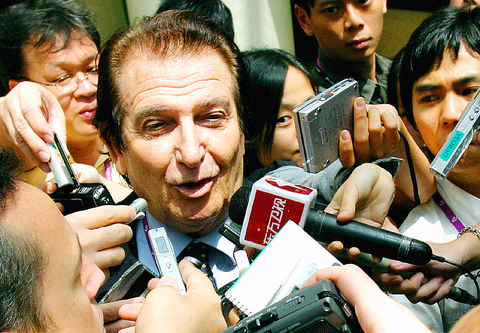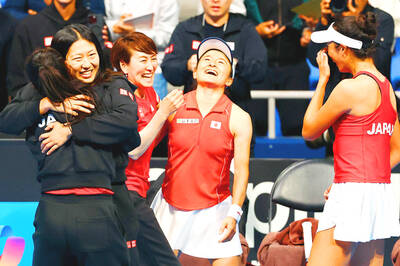Baseball and softball, two sports invented in America, were dropped Friday from the program for the 2012 Olympics in London -- the first sports cut from the Summer Games in 69 years.
Each of the 28 existing sports was put to a secret vote by the International Olympic Committee, and baseball and softball failed to receive a majority required to stay on the program. The other 26 sports made the cut.
The IOC will consider replacing them with two sports from a waiting list of five: golf, rugby, squash, karate and roller sports. That decision will be made Saturday.

PHOTO: EPA
Baseball and softball, which will remain on the program for the 2008 Beijing Games, are the first sports eliminated from the Olympics since polo in 1936.
Baseball, which became a medal sport in 1992, has been vulnerable because it doesn't bring top Major League players to the Olympics and because of the sport's doping problem in the United States. Softball, a women's medal sport since 1996, has been in danger because of a perceived lack of global appeal and participation.
IOC president Jacques Rogge said the two sports would be eligible to win their way back onto the Olympic program for 2016.
"I feel like somebody who has been thrown out -- it's certainly not a good feeling," said Aldo Notari, the Italian president of the international baseball federation. "I don't think the IOC members know our sport deeply enough. But we'll continue to survive. We're looking ahead to Beijing and putting on a good show."
The absence of major league stars from the Olympics is a big issue for the IOC, which wants the world's top athletes from all sports in the games.
"The lack of the MLB players -- I think people have looked and said, `Well, all right, if there's to be a change, that seems to be the logic of it,'" British IOC member Craig Reedie said.
Baseball's steroid problem in the US was cited as another factor. While Major League Baseball has toughened its drug-testing programs, they still fall far short of Olympic standards.
"Problems with doping in US baseball probably cost the sport dearly," Australian IOC member John Coates said.
Several IOC members also cited high stadium costs associated with both sports, saying baseball and softball venues have little post-games use in some host cities.
"I think they've made a big, big mistake," said Tommy Lasorda, the former Dodgers manager who guided the US team to the gold medal in the 2000 Sydney Games. "Baseball is played by all countries now and softball, too. I think that's really going to hurt the Olympics. I don't want to knock the other sports, but I think this is a big mistake. I am very disappointed."
Don Porter, the American president of the international softball federation, said he was devastated by the vote.
"We thought that we had a lot of support," he said. "The members told us we were getting support, but obviously we weren't."
Porter said the decision goes back to Mexico City in 2002 when Rogge tried -- but failed -- to get baseball, softball and modern pentathlon removed.
"It took them three years and now they got us out," he said. "I just think the IOC wanted some opportunity to introduce several new sports ... and in order to do that, they had to remove a couple of sports and that's what they did today."
Porter noted that modern pentathlon, which has been on the program since the first modern games in 1896, had tradition and European support on its side.
"Europe has strong voting power in the IOC," he said. "They worked hard, they did the right thing to get enough to stay in."
The IOC executive board was to meet later Friday to decide which of the five sports from the waiting list to recommend for 2012. No more than two can be added in keeping with the IOC's ceiling of 28 sports. A two-thirds majority of the full assembly is required for initial acceptance as an Olympic sport, followed by a simple majority vote for inclusion on the 2012 program.
The IOC kept Friday's voting figures secret. Not even the IOC members or sports federations were given the totals. The secrecy was requested by the international federations in order to avoid any ranking or embarrassment for any sports which just barely made the cut.
modern pentathlon
Even as the Olympics moves to update its program with new events, one of its oldest sports -- modern pentathlon -- has survived a vote to remain in the Games.
The multidiscipline sport, which combines shooting, fencing, swimming, running, and equestrian show jumping in a one-day event, was among those considered vulnerable when the International Olympic Committee picked the 2012 London Games program on Friday in Singapore.
"Everybody was nervous," said Klaus Schormann, the German-born president of the international modern pentathlon federation, or UIPM.
However, Schormann said he "had a good feeling the IOC members are following us, trusting us."
Despite a tiny audience -- just 0.4 percent of tickets sold at last year's Athens Games -- modern pentathlon has survived on the back of its storied past and a pledge to reinvigorate it for a new audience.
The sport was invented by Baron Pierre de Coubertin, founder of the modern Olympic Games, who based it on the purported exploits of a 19th century French cavalry officer and a competition among ancient Spartans.
It was made an Olympic event at the Stockholm Games in 1912, while a women's competition was introduced in 2000.
Equestrian
Equestrian events for the 2008 Beijing Olympic Games will be switched to Hong Kong due to the concerns over animal diseases in China's capital, the IOC announced Friday.
The agreement finalizes Beijing's push to have the equestrian competition moved about 2,000km away to Hong Kong, which is free of equine diseases common on the Chinese mainland.
"Let me be very clear in that everyone would have wished that the competition could have been in Beijing," International Olympic Committee President Jacques Rogge said at an IOC meeting in Singapore where the decision was announced.
"Sanitary problems make this very difficult and by mutual agreement [the groups] have decided to move to Hong Kong," he said.
The agreement finalizes locations for all Beijing 2008 competitions.
The international equestrian federation had originally objected to the switch because it would separate the sport from audiences and competitors in Beijing, about a four-hour flight away.
However, FEI president Infanta Dona Pilar said Beijing's organizing committee, BOCOG, had assured the federation that Hong Kong, where horse racing is a major industry, would offer the best conditions for equestrian athletes and horses.
"Hong Kong is very knowledgeable about horses and we are going to have a great Olympic games in Hong Kong," Pilar said. "The only thing I am sorry of is to be far away from the Olympic family and from the rest of the Olympics. You cannot go and come back in one day like you can in all the other venues.''
Pilar said competition timetables could be scheduled to offset the effects of Hong Kong's August heat and humidity on the horses.
"The atmosphere will be fantastic. People love horses all over China but in Hong Kong they know a lot about them and the atmosphere will be great," Pilar said.
BOCOG executive vice president Wang Wei said the move was the "best possible solution."
"We are convinced that the Hong Kong venue will enhance the quality and the excitement of the Games in 2008," Wang said.
When Melbourne hosted the 1956 Olympics, equestrian events were held in Sweden because of Australia's strict quarantine restrictions.
Former British colony Hong Kong reverted to Chinese rule in 1997 but maintains its own capitalist economy and independent legal system.
Hong Kong had lobbied hard to host the equestrian events, planned for the Shatin racecourse complex and surrounding Penfold Park.
"We'll be making sure it will be something they won't forget," the president of the territory's Olympic committee, Timothy Fok, said.
Pilar said her federation planned to work with BOCOG in setting up an equestrian training and competition center outside Beijing as a legacy of the games.
The center, whose location will be decided next year, would be surrounded by a 10km disease-free zone.

College basketballer Kaitlyn Chen has become the first female player of Taiwanese descent to be drafted by a WNBA team, after the Golden State Valkyries selected her in the third and final round of the league’s draft on Monday. Chen, a point guard who played her first three seasons in college for Princeton University, transferred to the University of Connecticut (UConn) for her final season, which culminated in a national championship earlier this month. While at Princeton, Chen was named the Ivy League tournament’s most outstanding player three times from 2022 to last year. Prior to the draft, ESPN described Chen as

College basketballer Kaitlyn Chen (陳凱玲) has become the first player of Taiwanese descent to be drafted by a WNBA team, after being selected by the Golden State Valkyries in the third and final round of the league's draft yesterday. Chen, a point guard who played her first three seasons in college for Princeton University, transferred to the University of Connecticut (UConn) for her final season, which culminated in a national championship on April 6. While at Princeton, Chen was named the Ivy League tournament's most outstanding player three times from 2022 to last year. Prior to the draft, ESPN described Chen as a

Kumar Rocker, a first-round pick in both the 2021 and 2022 drafts, on Thursday won for the first time in the major leagues. Rocker struck out a career-best eight in a career-best seven innings as the Texas Rangers beat the Los Angeles Angels 5-3 to complete a three-game sweep. Rocker (1-2) threw a career-high 78 pitches and allowed three runs on five hits without a walk. The 25-year-old right-hander was drafted third overall by Texas in 2022, a year after concerns over a physical led to him going unsigned by the New York Mets as the 10th overall pick. He made his major

Japan yesterday secured a second consecutive Billie Jean King Cup finals appearance with a 2-1 win over 2023 champions Canada, thanks to Ena Shibahara and Shuko Aoyama’s 6-3, 5-7, 6-2 win over Kayla Cross and Rebecca Marino in the qualifying doubles decider. Shibahara and Aoyama powered through the opening set 6-3, breaking twice for a quick 3-0 lead. Cross and Marino hit back in the second, edging it 7-5 to level the match, before the Japanese pair regained control in the third. Canada’s 18-year-old Victoria Mboko edged Shibahara 6-4, 6-7 (8/10), 7-5 in a marathon opening clash. Mboko fired eight aces to